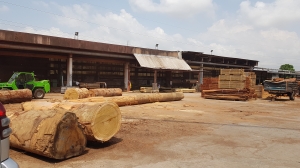FAO and the EU extend support to Government institutions and NGOs to develop capacities and tools to ensure forest communities benefit from commercial logging
Monrovia, 17 December 2020

The FAO-EU Forest Law Enforcement, Governance and Trade (FLEGT) Programme has launched two new projects to strengthen the forest resource benefit-sharing system in Liberia, to build capacity at both the institutional and community level.
The Programme has partnered with the National Union of Community Forestry Development Committees to increase the capacities of forest communities to monitor the benefits they receive through commercial logging, including through the renegotiation of Social Agreements.
In parallel, the Programme has also launched a new project with the National Benefit Sharing Trust Board to build the capacities of the National Board to better manage and monitor community development projects submitted by Community Forestry Development Committees.
Under Liberian Forest Law, forest communities dependant on forests under Forest Management Contracts are entitled to 30 percent of the Land Rental Fees paid by logging companies into the National Benefit Sharing Trust. Through participatory community consultations, Development Committees create project proposals aimed at improving livelihoods and infrastructure. The National Trust Board receives and reviews the applications and disburses the funds to the Development Committees to implement the selected community development projects.
In addition, forest communities benefit from Social Agreements, designed to ensure that logging companies fulfil corporate social responsibilities to the communities living in and around their concessions. Social Agreements include provisions such as maintenance and building of infrastructure including roads, provisions on workers’ rights, housing and social service. Social Agreements are negotiated with communities and implemented directly by the companies. The project will assist communities to renegotiate ten social agreements and monitor an additional eleven.
Increasing women’s representation in Community Forest Development Committees
At the community level, achieving high levels of representation of women in Development Committees is a persistent challenge. To address this, the Union will identify and mobilize women’s groups and leaders within communities to take part in training to facilitate active engagement in Development Committees.
The Union will conduct two-day training sessions in five locations for the 100 women identified through field visits. These regions have been selected due to the comparatively low female representation in governance processes.
The trained women will play a central role in the second phase of the project, which supports 200 Development Committee officials and members from ten regions, who will be trained to draft and negotiate Social Agreements with logging companies. Communities and the Union will then monitor the renegotiated agreements to document lessons learnt, with a final report disseminated across the Development Committee network and to external stakeholders. Members of the Union will raise the women’s awareness of their role in community development and share technical knowledge on how to run for election to leadership positions in the Development Committees.
Supporting the active involvement of women in local forest governance and community development processes is essential to help address the challenges faced by women in forest-dependent communities, by capitalizing on first-hand knowledge of forest resources. Community-level participation is expected to result in greater representation and involvement of women in governance processes at regional and ultimately at the national level.
Reinforcing the capacity of forest institutions
The National Trust Board will update guidelines to assess project proposals received from the Development Committees, as well as to monitor and evaluate the selected projects. Both members of the National Trust Board and Development Committee members will receive trainings on these guidelines.
The new guidelines build on a “Management Guide” produced by the Union, with support from the FAO-EU FLEGT Programme. The Guide provides tools to communities to collect information, such as templates to calculate timber yields and land rental fees. At the same time, the Guide serves as a reference tool to the Union to manage projects and successfully implement Social Agreements.
Building the capacity of forest-dependent communities to submit and effectively implement community development projects capitalizes on Liberia’s unique benefit-sharing legal provisions, bringing significant socio-economic benefits.
Adequate, clear frameworks for benefit-sharing in Liberia are integral to improving timber legality. As communities associate legal harvesting with community development and infrastructure, they are more likely to advocate for their rights and reject illegal practices in their forests. Ensuring equitable and full access to the benefits of natural resources is central to a sustainable development agenda that leaves no one behind.
Since 2016 the FAO-EU FLEGT Programme has supported 14 projects in Liberia, amounting to over USD 1 000 000, primarily focusing on capacity building and institutional strengthening.
The FAO-EU FLEGT Programme of the Food and Agricultural Organization of the United Nations is a global demand-driven initiative that provides technical support and resources for activities that further the goals of the EU’s FLEGT Action Plan. The Programme is funded by the European Union, the Swedish International Development Cooperation Agency, and the Foreign, Commonwealth and Development Office of the United Kingdom






